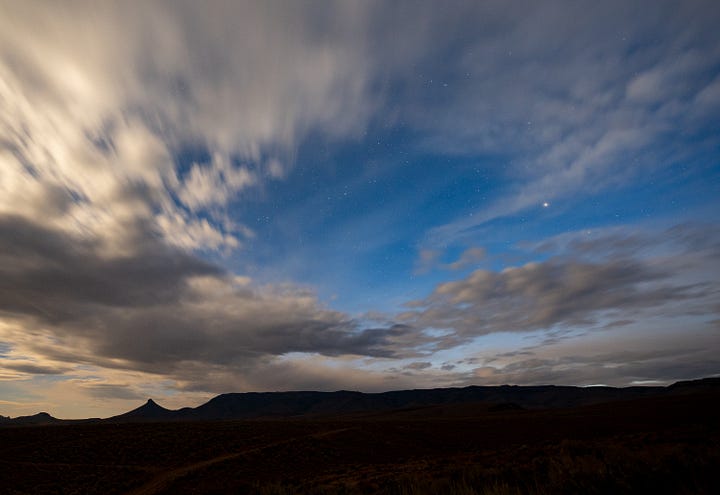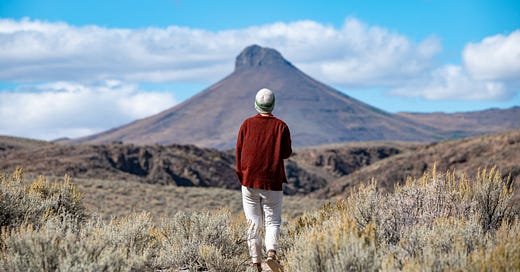How much land must be sacrificed to the machine?
A video report from the site of yet another planned open-pit lithium mine.
If you’re new here, welcome. I’m Max Wilbert, the co-author of Bright Green Lies: How the Environmental Movement Lost Its Way and What We Can Do About It and co-founder of Protect Thacker Pass. This newsletter focuses on sustainability, greenwashing, and resistance. You can subscribe for free. Paying for a subscription supports my writing and organizing work, and gets you access to behind-the-scenes reports and unreleased drafts.
Mountaintop removal for lithium to go into electric vehicle batteries is ecocide, just like mountaintop removal for coal mining is.
Earlier this week, I visited the site of yet another planned open pit lithium mine that is threatening the Great Basin — this time, in the state of Oregon. This site, about 15 miles north of Thacker Pass, is vital habitat for the Lahontan cutthroat trout, sage grouse, and countless other species — and it would be completely destroyed if the mine is built.
Yes, global warming is a crisis, and yes, we must stop burning fossil fuels. But this is not the way forward. This is an addict seeking another hit. The "green" energy economy destroys the planet, same as the old fossil fuel energy economy. This project is another greenwashing lie, just as we wrote about in "Bright Green Lies." If you want a primer, read that book and watch the film version of "Bright Green Lies" and Jeff Gibb's "Planet of the Humans."
In honor of the late Utah Phillips, I've listed the names and addresses of the people who run Jindalee Corporation on a previous Substack article, here: https://maxwilbert.substack.com/p/the-purpose-of-regulatory-permitting
To stay up to date and get involved, please visit https://ProtectThackerPass.org and signup for our email updates.










thank you Max. Having a briefer comment from you to encourage others to concentrate on the emergency is quite useful - I've heard the from several people over the weeks. All want to learn, and briefer comments , as well as the photos, keep our guests at the Welcome House2 (Homeless shelters) searching for more in the libraries they can reach. I think you give them a sense of that that if they work very hard, we all might have a chance to turn the tide. (It's also helpful to me personally as I'm bind in one eye.) And your comment on the day of Myron Dewey's passing fuels my determination.
See this: Matthias Schmelzer, The Hegemony of Growth: The OECD and the Making of the Economic Growth Paradigm (Cambridge University Press, 2016) —
...'the green economy has been characterized as the “next oxymoron,” similarly unable to reconcile effective environmental protection with free trade and growth.'
full quote, 332-333.... 'The “imperial mode of living” based on mass consumption and high mobility in the global North has increasingly become universalized through the fast growth of emerging markets, and since 2008 the global economy uses the resources and sinks of more than 1.5 planets every year. In the wake of the financial and economic crisis that has hit countries around the world since 2007, states and international organization have again stepped up efforts to revisit traditional economic goals and models. The most influential new concept that emerged as the guiding principle of powerful institutions to reshape society-nature relations was the “green economy,” which built on earlier debates about a “Green New Deal” and ecological modernization more generally and promoted market and technological reforms to reconcile economic, ecological, and social goals. Yet the green economy concept went even one step further by appropriating ecological crises for the reinvention of capitalism. As argued in a recent volume: “Its underlying message is attractive and optimistic: if the market can become the tool for tackling climate change and other major ecological crises, the fight against these crises can also be the royal road to solving the problems of the market.” Due to its similarity with earlier attempts such as “qualitative growth” in the 1970s or “sustainable development” in the 1990s, the green economy has been characterized as the “next oxymoron,” similarly unable to reconcile effective environmental protection with free trade and growth.'